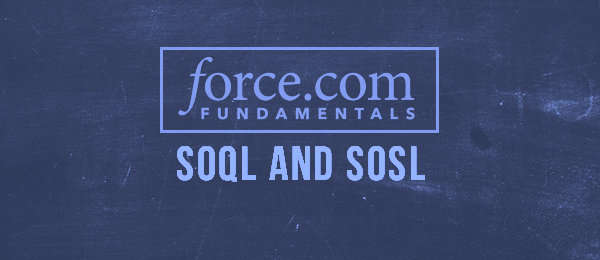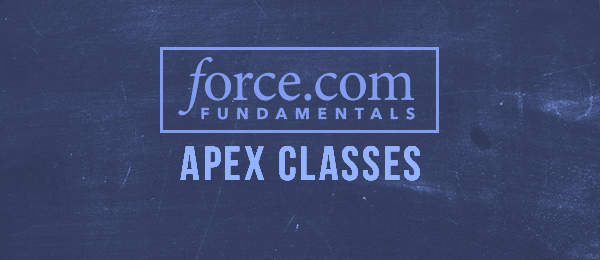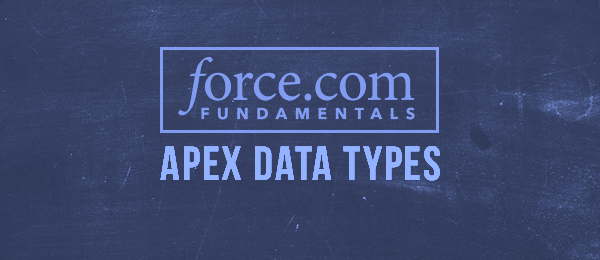Aligning your company’s sales process with your customer relationship management (CRM) system is essential for six reasons. 1. Improved Efficiency Streamline and automate various tasks, such as lead tracking, deal management, and customer communication, eliminating manual data entry and reducing administrative work, allowing your sales team to focus more on selling and building relationships. 2. Enhanced Visibility Gain better visibility into your sales pipeline and customer interactions, letting you track the progress of deals, identify bottlenecks, and make informed decisions based on real-time data. 3. Consistent Customer Experience Sales representatives can access comprehensive customer data, including interactions, preferences, and purchase … Read More
Force.com Platform Fundamentals: SOQL and SOSL
SOQL (Salesforce Object Query Language) Use SOQL to construct simple but powerful query strings in the queryString parameter in the query() call, in Apex statements, in Visualforce controllers and getter methods, or in the Schema Explorer of the Force.com IDE SOQL statements are similar to the select statement in SQL SOQL statements are case-sensitive SOQL statements can be used in Apex and the Web Services API If the output of a SOQL statement is an “Consider and Index Filter” error, it means the statement is returning too many records in which case you need to use a WHERE clause to restrict … Read More
Force.com Platform Fundamentals: Apex Classes
Apex Classes: An apex class is a blueprint from which Objects are created Classes consist of attributes and methods Classes may contain other classes, known as inner classes (one level deep nested classes) Static attributes and methods can only be declared in a top-level class definition Exception class must be extended in case you want to create new extension classes Classes can be enabled or disabled for different profiles Syntax: private | public | global [virtual | abstract | with sharing | without sharing | (none)] Class className [implements interfaceName | (none)] [extends classOrInterfaceName | (none)] { // Class … Read More
Force.com Platform Fundamentals: Apex Data Types
Apex Data Types include: Primitive Enum sObject Collection Primitive Data Types: Include the following: Boolean Date Date/Time Time ID Integer Long Double Decimal String Blob Object Enum Data Types Is an abstract data type that allows you to store the values of a finite set of identifiers Defined using the keyword ‘enum’ Built-in enums viz. System.StatusCode returns API error codes Some enum methods: Values() – returns a list of values for the enum Name() – returns the name of the enum sObject Data Types Represents Objects (Standard and Custom) in Salesforce.com Can be either strongly typed or … Read More
Force.com Platform Fundamentals: Apex
What is Apex? Apex is a strongly typed, object-oriented programming language that allows developers to execute flow and transaction control statements on the Force.com platform server in conjunction with calls to the Force.com API. Using syntax that looks like Java and acts like database stored procedures, Apex enables developers to add business logic to most system events, including button clicks, related record updates, and Visualforce pages. Apex code can be initiated by Web service requests and from triggers on objects. Apex vs. Java They are both similar in syntax and notation, strongly typed and transactional. Both support OOP features viz. Encapsulation, Inheritance, Polymorphism. Apex runs in a Multi-Tenanted environment and is limited by … Read More
Microsoft CRM 3.0 – Hide Links in Left Navigation – Example Code
Here is an example of code to get stripped down contact and account forms. This code is placed in the onLoad event of the respective forms. Note: this is not supported, but a common way to hide left navigation links on specific entities (since normal site map customization does not affect these).
CRM Titan (4.0) Preview
If you have worked with or implemented Microsoft CRM 3.0 (or even previous versions like 1.2), you will know that there are some features that could really help improve the implementation, development, and end-user experiences. CRM Titan (4.0) has the promise of bringing together some of these features in this third major release of Microsoft CRM (yes, they skipped 2.0). Along with multilingual capabilities, one of the main hot-points is the SaaS offerings. Microsoft CRM will be available in 3 architectural flavors: On-Site (Self Hosted) — as done in the past Hosted by Partners Hosted by Microsoft The SaaS offerings … Read More




